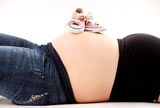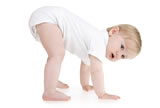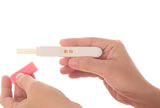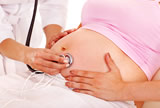Pregnancy week 28
Week 28 of Your Pregnancy
You are now starting the third trimester of your pregnancy. Although you may be starting to feel a bit like a beached whale, remember that you're getting close to the finish line and within a few weeks, you'll be holding your new little bundle of joy in your arms. This last part of your pregnancy often feels like it's stretching out forever, but it will go by much faster than you think.

Your baby is busy getting ready to be born. He's practicing breathing, along with a bunch of other stuff. Most of his body's major systems are fully functioning, so this trimester is a time to focus on gaining weight. For the final 12 weeks of the pregnancy, your baby will on average add twice as much weight as he did in the entire first 28 weeks.
Starting now, you will most likely be seeing your doctor every two weeks so she can keep a close eye on you and your baby during this final stretch. This will drop to weekly once you get to 36 weeks, for the last month of the pregnancy. This visit may include double-checking for certain conditions, such as HIV or chlamydia. You may also have to have a 3-hour glucose screening if your prior testing results were higher than normal.
Another thing that will happen at this point is relatively rare, but if you are Rh negative, you will be given a shot of Rh immunoglobulin this week in order to stop your body from producing antibodies that can attack your baby at birth. You will get another injection after birth, if the baby tests as Rh positive. This will prevent complications for you and your baby.
Your Baby in Week 28
At this point, your baby weighs around 2 ½ pounds and is between 14 and 16 inches long. That's quite close to the average length of newborns, but this last part of the pregnancy will see the baby put on approximately twice as much weight as he has during the first two trimesters. His body fat is only around 3%, while it will be around 12% to 14% at birth. This additional fat will smooth out most or all of the wrinkles that are on your baby's skin right now.
The baby's lungs are close to mature and at this point, there is a 90% survival rate for premature deliveries (with neonatal support). He is practicing breathing and is now hiccuping, sucking and even coughing as his lungs fully mature. All of these actions help the lungs to finish developing. Other organs are mostly developed and functioning, with a little more maturing left, and the adrenal glands begin to produce androgen and estrogen.
Brain development, which has been going on steadily since the first trimester, is really taking off at this point. All the grooves that exist on an adult brain are developing now and the brain size will really balloon during the home stretch of the pregnancy. Brain volume can increase up to 5 times what it is this week, along with adding billions of new neurons.
Your baby can distinguish light and dark by now, and if he hasn't opened his eyes yet, he will this week. Blinking is a new activity as the baby's muscles continue to develop and he can now make tears.
Eyelashes and eyebrows are now apparent and fingernails and hair are also growing. The fine coating of downy hairs called lanugo is mostly gone. Your baby's senses are developing rapidly and he can both taste and smell at 28 weeks.
By now, your baby has established a sleep pattern of regular intervals of wakefulness and sleep. There is now the rapid eye movement (REM) phase of sleep, which also means your baby could be dreaming. His sleep pattern may be opposite yours, as the baby tends to go to sleep as you move around throughout the day and then wake up when you settle in for the night.
The muscles and skeleton are pretty much fully developed, although they now need strengthening. He can turn his head back and forth now, which will help to strengthen his neck, and of course, he's probably doing a lot of kicking and punching. All this activity is like baby exercise, preparing his muscles and bones for life outside the womb. The bone marrow is functioning and busily producing blood cells.
Your doctor may tell you that the baby is in position this week. This means he has settled in the right position for birth, with his head facing down towards the birth canal. Don't be alarmed whether the baby is in position or not. Being in the proper position doesn't mean he's getting ready to be born early, nor is not being in position a problem this early.
Your Body in Week 28
Most women gain roughly 11-12 pounds during the last 12 weeks of their pregnancy. This is almost half of what most doctors recommend for the entire gestation period. Because of this rapid burst of weight gain, this is the time that most women start seeing stretchmarks, even if they haven't before now. Continue to moisturize your skin, especially the abdomen and breasts, and drink plenty of water to keep your skin hydrated. Don't be alarmed to see a stretchmark or two appear, no matter what you do. Most will fade quite a bit once you have the baby.
With most babies getting into the proper birth position, many women feel some pressure from the baby's head and the uterine weight. This can cause discomfort, particularly on the sciatic nerve. This nerve goes through your lower back, bottom and legs. Sciatica is the diagnosis when this nerve is irritated and it can cause shooting pains from your buttocks and down your legs. If you experience sciatica, try getting off your feet more to relieve the pressure on the nerve.
Another thing that all that extra weight and pressure can cause is restless leg syndrome (RLS). Often described as a 'creepy-crawly' sensation in the legs, RLS can also create the compelling urge to move your legs, especially when you're relaxing or going to sleep. If you experience RLS, you can try doing some leg stretches to relieve the muscles or massage your legs (better yet, have someone else massage your legs). Also, you should avoid caffeine because that often makes RLS symptoms worse, although it's unclear why.
At 28 weeks, your uterus has stretched to about three inches above your belly button, or around the base of your ribcage. This, along with the extra weight, presses against the tubes that go from the kidneys to the bladder, as well as on the bladder itself. That is the main reason that frequent urination usually becomes an annoyance again in the last trimester.
Unfortunately, the pressure on those tubes, along with the increase in progesterone production, can make it harder for your urinary tract to eliminate bacteria or toxins. This makes you more susceptible to developing urinary tract infections (UTIs) during the third trimester. While your urine will likely be checked every doctor visit, be sure to call your doctor in between checkups if you experience any pain or burning during urination.
Sleep can come at a premium at this stage in your pregnancy. Your baby often has a tendency to be awake when you're trying not to be, and it can be really hard to either get to or stay asleep with little feet kicking you in the ribs or the bladder. It's also a lot more difficult to find a comfortable position to sleep in, especially for those who used to be stomach sleepers. Don't be afraid to nap if you need to as you need your rest, whenever you can snatch it.
Week 28 Pregnancy Symptoms
As you enter the third trimester, you may find that some of the earlier symptoms of pregnancy have disappeared. At the same time, you will likely see some early symptoms reappear and naturally, some brand new pregnancy symptoms. You will very likely not experience all of the following symptoms, as every pregnancy is different, but here are the most frequently seen pregnancy symptoms for week 28.
Breast changes – While you may or may not have seen any changes in your breasts before now, at this point you definitely will see some changes happening. Your breasts are likely to be fuller than they were, particularly as the mammary glands are now producing colostrum (pre-milk). This fullness often causes breast tenderness. Most women also will find that their areola (the area around the nipple) becomes darker during the third trimester.
Difficulty sleeping – As mentioned above, it can be hard to get to or stay asleep at this stage of the pregnancy. While a lot of this may be due to the growing belly and a more active baby, many women also can experience heightened anxiety and restlessness at this point. Whether this is your first child or your fifth, there is almost always some anxious feelings to deal with as you approach the impending birth. Try to relax as much as possible and sleep whenever you can get the chance.
Headaches – During pregnancy, increased blood volume can cause pressure that leads to a headache. Hormone changes are another common headache trigger. If you experience more frequent or more severe headaches, talk to your doctor about the best pain reliever to take during pregnancy. Also, learning some relaxation techniques and reducing stress can help to relieve your headaches.
Leg cramps – All that extra weight, plus the change in your center of gravity, puts a lot of extra pressure on the muscles in your legs. This can cause the muscles to cramp up, especially when you lie down and try to relax or go to sleep. These can be very painful. When you experience a leg cramp, push or pull the foot on that leg up towards your body. If you can't do it yourself, ask someone to gently push the ball of your foot forward, so your toes are trying to point towards your head. Hold this for a few seconds and the cramping muscle will stretch out and relax.
Constipation – If you haven't had this issue before now, it's quite likely you will during the third trimester. Drink lots of water and eat plenty of fiber. If all else fails, you can take a stool softener which won't cause you to go, but will make it easier when you do.
Hemorrhoids – Between the frequent constipation and the added pressure on the rectum, hemorrhoids are a common pregnancy symptom. Hemorrhoids are what it's called when the veins in or around the rectum become inflamed and swollen. Use a stool softener if you're experiencing a lot of constipation, as this will reduce straining to go, which makes hemorrhoids worse. Witch hazel pads wiped over the area can help shrink the inflamed tissues and relieve the discomfort.
Increased hunger - Although we now know that the old 'eating for two' adage is a myth, you may very well find your hunger increased during the third trimester. The baby is growing rapidly during the remaining weeks of your pregnancy and therefore needs more calories than he used to. It's okay to eat more if you are hungry, just try to avoid junk calories. Focus on complex carbohydrates that keep you feeling fuller, but provide lots of nutrition for the growing baby.
Round ligament pain – This is a new pregnancy symptom that occurs when the all the round ligaments in your lower abdomen get stretched as the baby and your uterus grows. These bands of tissue support the muscles and organs, as well as your uterus. You may feel sudden sharp little pains around your abdomen or it may just be achy and sore. This is normal and nothing to be concerned about.
Shortness of breath - As the uterus expands, it can put pressure on the lungs, which can make you feel slightly short of breath. Unless it is a sudden or very severe shortness of breath, this isn't anything to be alarmed about.
Coming Up Next
You're in the final home stretch now – only 12 weeks to go before you get to cuddle your new baby. It's time to start really planning for that special day. If you haven't prepared a hospital bag, it's a good time to put that together, as well as discussing how to handle things with your partner or birthing coach.
Now is also the time to get you and your partner signed up for birthing classes. These usually take 4-6 weeks, but you don't want to wait until the last minute. Check with your insurance company and see if they'll cover any expense. Because classes help reduce complications, many insurers will offer some type of financial coverage.
Video Source: Youtube
Copyright © 2012 Babiesbase.and respective owners. All rights reserved.
Other product and company names shown may be trademarks of their respective owners.











 Sign up for our week by week
Sign up for our week by week




